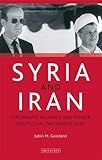The problem is this: if you're looking at the drinks while you're walking, you'll try to compensate for the movement of the liquid in the glass based on what you see. And it won't work. Because all you're seeing is the liquid moving in response to things that have already happened. To avoid this, you simply look away – focus on where you're headed, and your hand will automatically compensate for whatever's happening on the tray.
I've been repeatedly reminded of this over the last few days as the pundit class (professional and amateur) have continuously tried to reanalyze the constantly changing calculus surrounding Syrian use of chemical weapons and the world's response. Every event, large or small, prompts a new wave of analysis that, interestingly enough, always seems to confirm whatever they said previously.
But I'm sure that's just a coincidence.
Confirmation bias aside, thanks to cable news, the internet, twitter, text messaging, Skype, and everything else, most of these pundits think they're looking at what's happening, but all they're looking at is what has already happened. I'm reminded of Walter Benjamin's description of the Angel of History (famously quoted in Benedict Anderson's "Imagined Communities”)
A Klee painting named ‘Angelus Novus’ shows an angel looking as though he is about to move away from something he is fixedly contemplating. His eyes are staring, his mouth is open, his wings are spread. This is how one pictures the angel of history. His face is turned toward the past. Where we perceive a chain of events, he sees one single catastrophe which keeps piling wreckage and hurls it in front of his feet. The angel would like to stay, awaken the dead, and make whole what has been smashed. But a storm is blowing in from Paradise; it has got caught in his wings with such a violence that the angel can no longer close them. The storm irresistibly propels him into the future to which his back is turned, while the pile of debris before him grows skyward. This storm is what we call progress.As the pundits seek to analyze the continuous flow of chaos and information, their inevitable fallback is the certainty of their own deeply held positions.
So, towards that end let me save you the trouble of reading any analysis of the US and its actions in relationship to Syria today (and possibly tomorrow). Here are most of your possible op-eds and analysis pieces:
1. Obama is terrible and everything he does is terrible! (a.k.a. "this is bad for Obama”). It's a nice, easy, and convenient approach that always has a guaranteed audience. The articles practically write themselves. All you need to do is look at whatever happened yesterday and explain: Whatever Obama did was the absolute worst possible thing he could've done and/or Whatever happened is the final step in Obama’s inevitable failure as a president
2. Obama is great and everything he does is great! This has two basic variations:
(2a.) Everyone else is playing checkers and Obama is playing 10 dimensional chess - he is always ahead of the curve and always has his next dozen moves plotted out in advance.
(2b.) In a chaotic situation where no one has control and none of the choices are good, Obama is such a genius that he always picks the best possible option
3. War is never the answer! This has two subcategories:
(3a.) Obama hates war and is trying to avoid it
(3b.) Obama is just like Bush and desperately wants us to go to war
4. Violence is the only language these guys understand! We must intervene because of (choose any or all of the following)
(4a.) Iran
(4b.) Israel
(4c.) Chemical Weapons
Additional elements that can be included as needed:
- The rebels are really Al-Qaeda/cannibals
- The rebels were the ones who did the gassing
- Oil pipeline across Syria
So there you have it. Pick one and stick with it no matter what anyone else tells you.
(Keep in mind; it’s much more important to know what a schmuck at CNN, Fox News, the Washington Post, or Politico thinks about this than…say…a Syrian.)
